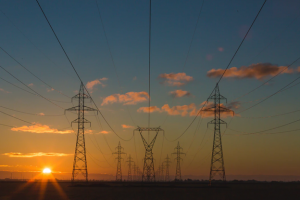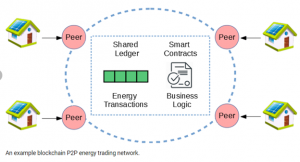Did you know that the blockchain space is expected to rise from USD 2M in 2018 to approximately USD 18M by 2025 in the energy market?
The impact of Blockchain in financial institutions is known to all. The technology is now gaining more attention in the renewable energy industry as well, its metaphoric potential appears remarkable.
Instead of being regulated by a single entity, Blockchain allows for decentralization and cannot be amended by anyone. With its distributed ledger, immutability, and cryptographic algorithm, it promotes transparency, enhanced security, and improved traceability.
The Potential of Blockchain in the Renewable Energy Sector

Image source:
Surpassing its cryptocurrency hype, blockchain technology has tremendous potential to redefine several other industries like Supply Chain, Education, Renewable Energy, etc. with these principles:
- Peer-to-Peer Transactions: Eliminating third parties from all transaction
- Customized Encryption Algorithm: People can build computational reasonings that triggers transactions automatically
- Distributed Ledger: It decentralizes the complete data
- Immutable Network: It is impossible to tamper with the transactions as the data is stored in sequential order
- Authority and Transparency: Each transaction is protected with a cryptographic hash, and individuals can choose to remain anonymous or expose their identification
Blockchain can help address issues related to energy transactions. It is also the technology that underlies the energy trading platforms and smart grids.
Key Advantages of Blockchain in Energy

Around 5% of the global energy transactions occur in a decentralized system where private homes with their solar cell abilities trade electricity to different households. As per the World Energy Council, this figure is predicted to expand to 25% before 2025.
Energy systems are experiencing accelerated reforms to adapt to the rising volumes of fixed renewable generation, including solar PV and wind. Renewable Energy Sources (RES) have been growing within the last few years, and Blockchain is here to make it more advanced:
- Blockchain is transforming the electricity market. It is an effective technique of designating generation assets to a particular period; it can also be utilized to set preferences when it comes to knowing the energy sources. This allows renewable energy processes to be automated with more prominent levels of traceability.
- This phase is essential if long-term PPAs (Power Purchase Agreements) are based on renewable resources, these agreements indicate the requirement or energy levels to validate that the energy provided is 100% from green sources. These contracts are an important role today as they encourage renewable energy expansion by promoting large enterprises to buy this energy.
- Blockchain also ensures the security and transparency of transactions that remain listed in the platform permanently, letting parties audit the outcomes. This innovation makes it reasonable to function under smart contracts that are executed when parties meet the consented terms automatically – eliminating third parties. This increases privacy and enhances security while decreasing costs.
Blockchain in Renewable Energy: 3 Core Transformations
“Innovative energy firms are implementing blockchain to enhance customer experience and streamline operations.”

Image source:
A number of reasons reveal why smart contracts are promising. Firstly, they lack an ambiguous interpretation. It is impossible to execute or approve a contract until it fulfills a set of requirements. This feature helps by saving substantial resources on legal contracts.
A smart contract doesn’t depend on a single authority for controlling and hosting, this eliminates any possibilities of data administration and/or disputes of interests. Any efforts to alter the contract will be monitored by the other nodes in the network, making it reliable and nearly impossible to amend the agreement.
Blockchain-powered smart contracts are extremely applicable to the renewable energy industry when it involves selling or purchasing. For example, if someone doesn’t pay their electricity bill within the pre-specified date, a smart contract activates an energy supply cut off automatically. More importantly, smart contracts can balance the energy supplies through demanding areas and perform several “if…then” transactions, associated with the stream of energy and financial assets.
- Transactions
P2P energy transactions have been around for a while. It requires a centralized entity, generally a service firm, who facilitates trading and transporting energy from prosumers to customers. Blockchain changes this by eliminating the intermediary and letting prosumers trade with each other and each customer individually and directly. It is of special interest to businesses that are using renewable energy sources, including solar or wind to be a part of this movement to reduce overhead costs while providing transparent services to end consumers.
- Data Management
Data Management around the transfer and validation of ownership is another area that Blockchain transforms and aids. In simple words, the nature of the technology is making the management and storage of data faster, easier to process, safer, and more transparent. Billing clients and invoicing for electricity, and other energy supplies, is far more protected and advanced via Blockchain, turning it into a successful application of Blockchain in this domain.
The potential energy use-cases of blockchain technology show a lot of promise. In addition to reducing transaction costs across the system, increasing the efficiency of processes, and thus delivering cost benefits for customers, the technology can enable direct interactions between all parties involved. This ensures that existing generation capacity is utilized optimally, whilst energy is made available at the best price. The role of prosumers is strengthened considerably under such a model.
Contact us, to see how KrypC can help redefine your Renewable Energy processes today!








Be First to Comment